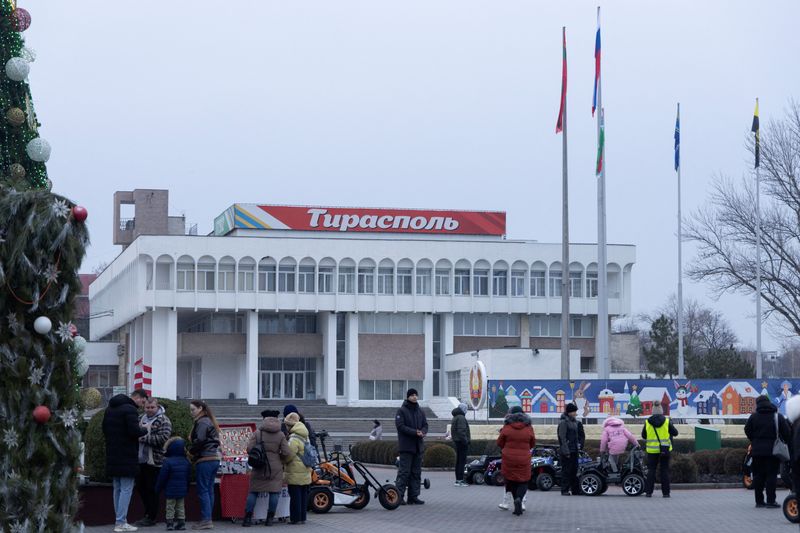
Written by Mark Trevelyan, Lucy Papachristou, and Philip Lebedev
(Reuters) – The cutting off of one of the last Russian gas export routes to Europe was felt most painfully in the small Russian-speaking separatist region of Moldova, which for decades has looked to Moscow for protection.
Russian-backed separatists broke away from Moldova with the collapse of the Soviet Union in the early 1990s, gaining de facto independence for the region of about 450,000 people known as Transdniestria.
Russia maintains about 1,500 soldiers there and has provided gas for free for a long time. That ended on New Year's Day when, nearly three years after Moscow's full-scale invasion, Ukraine refused to extend a transit agreement that allows Russia to pump gas through its territory into central and eastern Europe.
The blow to Transdniestria was immediate. Central heating and hot water were cut off from homes on Wednesday. The government said on Thursday that all industrial enterprises except food producers were forced to stop production.
When gas went out to his multi-storey apartment complex in Tiraspol, the main city, Boris, 54, retrieved a Soviet-era electric stove from his garage. It provides enough heat to cook meals and warm the kitchen, while the electric heater warms his and his wife's bedroom.
“My wife and I have a fixed income, and our children will help us, but what about the old retirees?” Boris, who requested that his full name not be revealed, told Reuters. “What will happen to them if the gas stoves go out?”
Another Tiraspol resident said there was no sense of panic but people were queuing up, sometimes by the dozens, to buy heaters and electric stoves.
Some residents told Reuters they were concerned about the rise in the prices of basic goods such as bread and pasta, as well as blankets, since Wednesday.
Payment dispute
Russia has been pumping about two billion cubic meters of gas annually to Transdniestria – including a power plant that supplies energy to all of Moldova, a country of 2.5 million people that wants to join the European Union.
Separately from the gas transportation dispute with Ukraine, Russian energy company Gazprom (MCX:) said on December 28 that it would stop supplying gas to Moldova on January 1 due to $709 million in unpaid gas debts that Russia says Moldova owes. Moldova rejects this, estimating the debt at $8.6 million.
Jonathan Eyal, international director at the think tank RUSI in London, said Russia's goal is to pressure Moldova, stir up problems between the central government and Transdniestria, and turn the energy crisis into a political crisis.
He said that it is in Moldova's interest to help the separatist region, whose declared independence has not been recognized by any country and which considers its people as its citizens. But it will have to impose duties on any gas it can send to Transdniestria, and this could lead to further disputes.
“There is no doubt that the government wants to help. The question is whether the separatists will want to accept help, and whether this could be a prelude to a much larger conflict rather than the beginning of a potential cooperative relationship.” He said in an interview.
“There is no doubt in my mind that Moscow is now counting on the possibility that the crisis will only exacerbate the separatist movement within Moldova.”
Russia blames Ukraine for stopping gas transportation and says the United States will benefit by selling more gas to Europe. Moscow denies using gas as a weapon to coerce Moldova, but said last month, as the gas cutoff date approached, that it would take steps to protect its citizens and forces in Transdniestria and “respond appropriately to any provocations.”
Moldovan Prime Minister Dorin Resian said on Friday that cutting off Russian gas supplies to Transdniestria had created a crisis for his country.
“We are treating this as a security crisis aimed at enabling the return of pro-Russian forces to power in Moldova and arming our territory against Ukraine, with which we share a 1,200-kilometre border,” he added.
“Russia will not abandon us”
In Transdniestria, authorities are extracting their remaining gas reserves, some of which is still being pumped into apartments so people can cook. The main power plant switched from gas to coal.
In Rybnitsa, a city of about 50,000 people in northern Transdniestria, 52-year-old Alla said she had set fire to one of the rooms in her house and that only “God's will” would turn the gas back on.
In Bender, a city with a population of 90,000 people, Maria Zolotukhina, 32, said her employer asked her to stay at home, where she was using an electric heater.

She did not know whether she would continue to receive her wages, but said she was counting on Russia to help her.
“We are allies of Russia no matter what happens. We hope that Russia will not abandon us,” she said.







